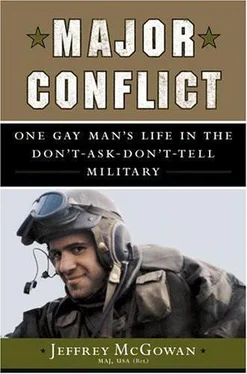Bragg is a massive, insulated institution surrounded by more than a quarter of a million acres of woodlands and mountains. The terrain is rough, like the assignments based there. In a word, it’s not a place for the faint of heart or mind. To be assigned to Bragg is a great honor, and I am extremely proud to have served there.
Ardennes Street runs straight through the middle of the base. Lined on both sides of the street, with high-rise barracks built in the 1950s, educational facilities, museums, a memorial chapel, and the occasional PX, it often feels more like a small town than the center of an army base that trains some of the world’s finest warriors.
I always took my morning run on Ardennes Street, which was closed every day between six and seven-thirty A.M. to all vehicular traffic for just that purpose, so that army personnel like me had a place to run. Having an entire stretch of road closed off for your morning run was just one of the many perks that came with serving in what some called, with little irony, gladiator land. I was never a particularly graceful or fast runner, so I was always grateful that Ardennes Street was flat. In a word, I’m no gazelle, and that’s an understatement. I’m closer to, say, a moose on ice skates, actually. But I knew that the surest way to develop endurance for the field was by simply placing foot to ground four miles a day, every day. It wasn’t a pretty sight, but it got the job done.
And so it was that I made my daily run one gorgeous spring morning in 1997. North Carolina mornings are truly spectacular, and this one was no exception. I knew I was about halfway done when I looped around the giant bronze statue of the Green Beret standing sentry in front of the JFK School of War. I was always hit with a sudden, strong wave of pride when I passed this statue. To wear a beret was special. It meant that you were highly sought after when the shit hit the fan. I wasn’t a Beret, but I was Airborne, which has its own special cachet, so it was a great feeling knowing that you and the men you commanded were thought of as somewhat indispensable. The bronze figure usually gave me the second wind I’d need to get back to the office.
My office was pretty comfortable by army standards. I had a rather large oak desk, a nice couch, and my own bathroom, complete with shower, an amenity that distinguished me from the other officers in my building who had to share showers with the troops. It was just one of the perks that came with command.
After finishing my run, I showered and changed and settled down at my desk to try to get some paperwork done. I had an open-door policy with my troops. I enjoyed being at the center of my battery’s daily activity. My men were hardworking, and I felt it was important that they know I was there for them if they wanted to talk. On this day, though, I really didn’t want to be disturbed since I had so much paperwork to get through. As I began reviewing soldier promotions and organizing inventories of battery equipment, my phone rang.
“Captain McGowan,” I said automatically, expecting one of the usual problems or requests from subordinates that come with being “the boss with the open-door policy.” But when I heard the voice on the line, I knew right away that this call was different. The man seemed annoyed, and he was speaking loudly. Turns out this was the call no boss in the army ever wants to receive.
“Yes, hello, sir,” the voice said, blunt, uptight, professional, “My name is Sergeant First Class Johnson. Are you the battery commander, sir?”
“I am. How can I help you?”
“Sir, I’m with CID,” he said, his voice thickening with a measured authority that filled me with a dreadful, sinking feeling. My stomach dropped. “We need to see one of your NCOs.”
It’s never a good thing to have the acronyms CID and NCO in the same sentence. You might think of the CID as the FBI of the military world. They wear plain clothes and work undercover, and there’s a terrible aura of secrecy about them. They’re extremely no-nonsense in demeanor, dealing largely with the nastier, more serious crimes, unlike the standard MPs, who deal mainly with misdemeanor crimes, generally involving too much liquor.
“Well, of course you can see one of my men, Sergeant,” I said, “that is, after you tell me what it is you’d like to see him for.” I was nervous, but I didn’t want the sergeant to hear it in my voice. The stronger I seemed, the more likely it was that I’d get some information out of this guy. The truth was, he didn’t have to tell me anything. CID doesn’t have to reveal anything about an open investigation. And their jurisdiction runs all the way up to the Capitol Building, and I don’t mean the capitol in North Carolina. Anything I could get out of the sergeant would be helpful in keeping the chain of command informed and would invariably simplify the whole process. If it was serious, and when CID called it almost always was, my bosses would be upset if I couldn’t explain to them what was happening, so that they could explain the matter to their bosses, and so on and so on.
“Captain, I’m not at liberty to give that information.” His peevishness sounded tempered by the awareness that I outranked him.
“All right, Sergeant Johnson,” I said, “let’s start over, shall we? Who is the man in question?”
“Sergeant Lopez, sir.”
I was somewhat relieved when I heard Lopez’s name. He was an exemplary soldier and one of the hardest workers in the unit.
“And?” I asked.
“And, sir?”
“C’mon, Sergeant, tell me what this interview is all about?”
“Sir, with all due respect, I can’t divulge any information in regards to an ongoing case. You as a captain should know that.”
The word captain had a little snide lilt to it. This guy is an asshole, I thought. And Lopez was a good man, I knew that, and one of my soldiers, so I wasn’t going to give up so easily.
“Well, Sergeant,” I said, a little malice in my voice now, “tell you what. If you can’t tell me what all this is about, well, then I’m afraid I’ll just have to inform the chain of command before I send him to you.”
“Sir, that really won’t be necessary. I—”
“I’ll be the judge of that,” I cut in. “You’ll hear from me by late this afternoon.” And I hung up the phone, cutting off the defensive response about military justice and the law.
I sat for a moment at my desk and took a deep breath. I dreaded the phone calls I now had to make. First, I called Colonel Fazio, my battalion commander at headquarters, and that call went over like a sack of bricks. The second call was to my company first sergeant to get him to tell Lopez to report to my office. I figured maybe Lopez would know what this was about. Then I made a few more calls to higher command at HQ , and everyone agreed that we would cooperate and not interfere. We’d find out sooner or later what they were up to. Just as I hung up the phone, there was knock at my door. It was Lopez.
Lopez was about twenty-seven, with thinning blond hair, a clipped mustache, and a solid build. He was one of the last soldiers in the unit I would’ve expected to get into trouble. I liked him a lot. He worked hard, did his job well, often went beyond the call of duty, and obeyed the rule of my command to the letter.
“Good morning, sir, you wanted to see me?”
“Yes, come on in and close the door.” I smiled at him as he walked in, raised up slightly, closed the door behind him, and stood at parade rest. I shook my head.
“No, Sergeant Lopez, no need for that, sit on the couch.”
He walked to the couch. I noticed nothing that would indicate he knew why he’d been called into my office, which only confirmed my suspicion that something else was going on. There was no point wasting any more time.
Читать дальше












